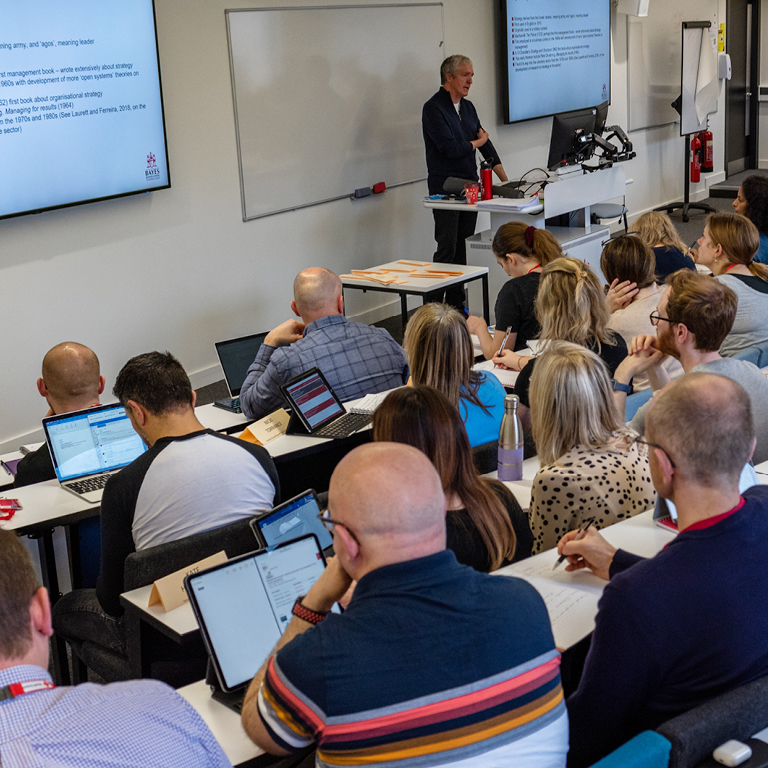Voluntary Sector Management MSc | PGDip

Key information
Duration: 12 months (PgDip) 24 months (MSc)
Attendance mode: Part-time
Fees: From £7,250 (PgDip) (more information)
Location: Bunhill Row
Start of programme: October 2024
Application deadline: Rolling applications
Entry year: Showing course information for 2024
Develop your management and leadership career within the voluntary and community sector
Overview
Voluntary Sector Management MSc | PGDip Who is it for?
You will have been working in the voluntary, community and charity sector for at least three years. You may alternatively have gained sound understanding of the sector through trusteeship or some other form of volunteering.
This course is ideal for you if you want to follow an advanced route for management and career development opportunities that encourage higher standards of effectiveness within the sector.
Course objectives
This course is your complete development programme for performance in the third sector. You’ll study along a path that blends theory and practice around subjects such as managing people and quality, and leadership and managing change. You will develop a broad knowledge and conceptual base in organisational analysis, leadership and change.
During your studies, you will be introduced to practical tools to help improve organisational effectiveness and individual performance in change management.
You will also develop a broad knowledge and conceptual base in the field of quality management, people management and the management of multiple stakeholder needs. You’ll explore the application of practical tools to help implement quality assurance systems in a nonprofit organisation, and theory and tools for managing individual performance.
Teaching staff

Justin Davis Smith is a Senior Lecturer and the academic leader on the MSc Voluntary Sector Management.
He was previously Chief Executive of Volunteering England, Director of the Institute for Volunteering Research and Executive Director of Volunteering at NCVO. He has over 20 years researching and leading in the volunteering movement and has advised the UK Government and the United Nations on the development of volunteering policy.
Accreditation details
The Charities Master's courses were accredited by the Nonprofit Academic Centers Council (NACC) in January 2019 as the only programme in Europe to be included in the first group reviewed. NACC Accreditation fosters third sector academic programmes worldwide.
Course content
- Gain broad knowledge and understanding of non-profit organisations, the external context within which they operate, and how they should be led and managed (integrating the different disciplines holistically)
- Develop and challenge your own understanding and appreciation of the conceptual foundation of these fields, and of their relevance in an applied setting
- Study a range of cognitive, intellectual and interpersonal skills and techniques to apply directly to your day-to-day work
- Develop deep, relevant insights into charity management from your peers from different but related backgrounds through networking, study and sharing of ideas
- Acquire the ability to deliver direct benefits back to your organisation in the form of recommendations for improved effectiveness across all the subject areas covered.
Course structure
Programme content is subject to change. We regularly review our module offering and amend to keep up to date and relevant.
Induction weeks
The Charities programme courses starting in October will have a final session for the in-person registration followed by an Induction Programme.
Modules
Learning and Understanding the Voluntary Sector (10 credits)
This module represents the starting point for you and the opportunity to learn about the process of learning and establishing plans for learning on the programme. It also offers a perspective on leading public/voluntary sector debates within an historical context, alongside a more enduring understanding of scholarly approaches to the understanding of developments and changes in the relationship between government and the voluntary sector.
Strategy, Diversity and Governance (20 credits)
This module aims to enable you to develop a broad knowledge and conceptual base in the field of strategy development, diversity and governance.
Marketing and Fundraising (10 credits)
This module aims to provide you with the concepts, underpinning knowledge, skills and techniques to plan and develop marketing and operations systems and enable students to analyse marketing needs, evaluate marketing plans, in the context of applying marketing concepts to their own organisation.
People Management in the Voluntary Sector (10 credits)
This module provides an appreciation of key aspects of voluntary sector human resource issues, including the critical issue of volunteer management. The module critically examines the origins and meaning of HRM as well as contemporary debates in the field of strategic Human Resource Management, including recruitment and selection, the psychological contract and HRM at strategic and operational levels.
Charity Accounting and Finance (20 credits)
This module aims to provide you with an understanding of the specialist charity accounting framework grounded in trust law and fund accounting principles and issues of financial management..
Shadowing (20 credits)
In this module you will develop a different perspective on the role and environment at senior management level in a different organisation by shadowing a senior manager or fieldwork consultancy exercise - observing and learning from the experience.
Organisation, Leadership and Change (15 credits)
This module aims to develop broad knowledge and conceptual base in the field or organisation analysis, leadership and change.
Managing People and Quality (15 credits)
This module aims to provide you with an in-depth grounding of the principles of financial management applied to the charity sector.
Assessment methods
The Postgraduate Diploma consists of five core modules that all students take and are common to all the five charity postgraduate courses. These core modules provide the essential underpinning of management skills for the specialist courses. Upon successful completion of the diploma you can continue to the MSc Programme.
The MSc requires completion of the Research Methods for Managers module. This is followed by either: a further six months of personal, supervised research and the presentation of a 15,000-word research-based dissertation. Or alternatively, you can opt to take a taught Masters which allows you to choose specialist modules from one of the other charities programmes.
Assessment methods
Term dates
October 2024 intake - standard route
| Schedule | Date |
|---|---|
Induction | 03 October 2024 |
| Learning and Understanding the Voluntary Sector | 04 - 05 October 2024 |
| Strategy, Diversity and Governance | 08 - 09 November 2024; 08 - 09 December 2024 |
| Marketing and Fundraising | 10 - 11 January 2025 |
People Management in the Voluntary Sector | 07 - 08 February 2025 |
| Charity Accounting and Finance | 07 - 08 March 2025; 04 - 04 April 2025 |
| Organisation, Leadership and Change | 09 - 10 May 2025; 13 June 2025 |
| Managing People and Quality | 14 June 2025; 18 - 19 July 2025 |
| Shadowing Exercise | Process to be completed by early August 2025 |
| Course Review Day | 05 September 2025 |
Term dates For students progressing from the Postgraduate Diploma Intake in 2023
| Schedule | Date |
|---|---|
Research Methods for Managers | 23 - 24 January 2026 |
Dissertation or Taught Masters Option | Completion by mid-September 2026 |

Fees & funding
UK/Home/International fee
October 2024 entry
£7,250
PgDip
An additional fee to convert to the Master’s degree*
Tuition fees are subject to annual change.
The fee for the Postgraduate Diploma is £7,250 for 2024/25 entry. A deposit of £400 is payable on acceptance of a place. For self-paying students, the balance is payable in two instalments, the first during the registration process September and the second at the end of January.
*The fee for those converting the Diploma to MSc is a further £4,200 for 2024/25 entry and is payable in one instalment at the beginning of the second year. The conversion fee for the following year of entry will be subject to an annual inflationary increase
Tuition fee increases
Where applicable, tuition fees for Bayes' programmes will be subject to inflationary increases in each year of study. Our policy for these increases is set out in City, University of London's terms and conditions of study.
Scholarships & bursaries
Students sponsored by their employer will need to complete a form. We also recommend looking at the government PG loan for funding.
Scholarships
Voluntary Sector Management students may be eligible for a scholarship from the Eastside Primetimers Foundation, application for this scholarship will open shortly.
View our scholarships and fundingOther funding opportunities
You may wish to look at the PG Loan option for funding.
View other funding optionsSponsorship
Students on the course who are sponsored by their employer will need to complete a sponsorship form as part of the application process. This can be completed for the Postgraduate Diploma or the MSc. An invoice for the full fees for the academic year will be sent to the employer in October for the Postgraduate Diploma. If the employer is a charity, they can request payment in two instalments by contacting the person named on the invoice. This arrangement allows the charity to spread the fees across two financial years.
View our sponsorship guidanceCareers
Students are selected on their professional experience, and generally continue working in their full –time role whilst undertaking this course.
Past students have come from a variety of organisations, including business and the public sector.
"For me, studying this master's gave me the conviction to take a step up; a leap of faith into a world of social impact bonds and outcomes contracts at a dynamic start up - something I would never have done otherwise. So I can say with confidence that I wouldn't be doing a job I love, if I hadn't studied this degree. Hopefully I've also made some lifelong friends along the way."
- Anna Cogger
"The MSc Voluntary Sector Management course gave me the skills to transform my organisation from a small single service charity into a respected player in public sector commissioning locally. The PG Dip year allowed us to measure the impact of our work to inform future practice, and to improve every aspect of the organisation from Governance to fundraising. Not only that but undertaking Masters research was a valuable and enjoyable experience for me personally!"
- Deborah Cartwright, CEO, Oasis Domestic Abuse Service
"I enrolled on the MSc in Voluntary Sector Management, and I found it enlightening and also good fun. The core tutors and guest lecturers were top quality, and were also very encouraging. They really pushed us to fully explore the subjects we were covering. Since graduating, every element of the course has proved extremely useful. I have been able to utilise everything from teaching on big picture vision, mission and values, to the detail inherent in the subject of financial management. Since graduating I had changed jobs and organisation, and moved into a more senior role. Studying at Bayes has been instrumental to this journey, and I enjoy continued contact with Bayes, and the opportunities that the Bayes community provides."
- Andy Langford, Director of Operations, Cruse
"The MSc in Voluntary Sector Management was a fantastic challenge and I thoroughly enjoyed every aspect of the course. I now have a much deeper insight in the challenges and opportunities facing the charity sector and I'm well equipped to help organisations think strategically about how to flourish and grow. This aside, the course was a lot of fun, I made some great friends and I am extremely proud to call myself an alumni of Bayes Business School."
- Jeremy Jalie, Performance Improvement Specialist, ASI
Entry requirements
All students will be highly motivated graduate-level people who bring a wide range of professional competencies, skills and experience from a wide range of backgrounds.
In general we ask for a good first degree, normally an upper second-class honours degree from a British University or a relevant professional qualification: e.g: ICSA; and three or more year’s relevant experience at a senior level. In exceptional cases we will also accept those without a degree but with significant work experience. Provided you have more than three years relevant experience, two professional references are acceptable.
English language requirements
In order to participate fully in the collaborative learning process all students who have not previously studied in English must sit an academic IELTS or TOEFL iBT exam.
The minimum required academic IELTS level is an average of 7.0 with a minimum of 6.5 in writing and no less than 6.0 in any other section.
We require a well-balanced overall score of at least 100 and no less than 25 in the Writing section in the TOEFL iBT test or the TOEFL iBT Home Edition test.
If you are not a native English speaker but have been working in the UK for the last three years it is unlikely you will need to take the test.
Apply
We are now accepting applications for October 2024 entry.
Apply for October 2024 Entry
Terms and conditions
Students applying to study at Bayes Business School are subject to City, University of London's terms and conditions.
Student life
We are located right in the heart of London. Being a student at City allows you to take advantage of all that London has to offer.
London is continually ranked as one of the 'Best Student Cities' in the world to study within (QS, 2019).
Contact us
Speak to one of our staff from Master's programmes teams.
